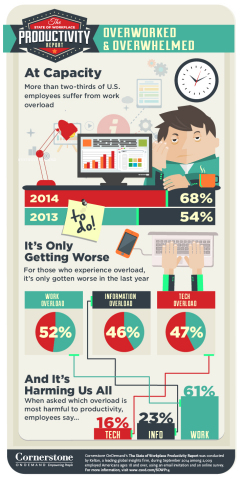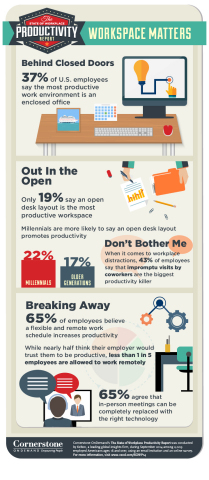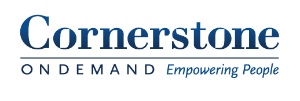SANTA MONICA, Calif.--(BUSINESS WIRE)--The unemployment rate may have decreased over the past year as more people are entering the workforce, but that doesn’t mean the workloads of those already employed are easing up. A new Cornerstone OnDemand (NASDAQ:CSOD) survey, conducted in collaboration with Kelton, reveals that 68 percent of U.S. full-time employees are suffering from work overload, a 14 percent jump from the 2013 study. And more than half (52 percent) of these employees say their work overload – where the amount of time they need to complete their assignments on a daily basis outnumbers the hours in the day – has gotten worse over the past 12 months.
While some workers are also overwhelmed by information (40 percent) and technology (27 percent), more than six in ten (61 percent) workers believe that work overload is most harmful to their productivity. This amplifies the frustrating paradox of today’s hyper-connected workforce: the more overworked people are, the more they have to work longer hours; the longer they work, the less productive they become; and the less productive they become, the longer they must work. And at a time when technology tethers people to work like never before, more than a quarter (26 percent) of those surveyed said they feel like they can’t turn off their job outside of work hours or even while on vacation.
Productivity Killers – and How to Combat Them
Conducted for a second year, Cornerstone’s “The State of Workplace Productivity Report” examines how the ways people work, where they work and the tools they use for work impact their abilities to be productive and successful in their roles. The findings indicate that the tools and management styles of today are not enabling employees to be the workforce of tomorrow. However, the results also point to potential solutions – such as flexible work schedules, the right work environment and wearable technology – that may hold promise for those trying to combat the most exasperating productivity killers in their work lives.
Key survey findings include:
- 9-to-5 Is So Last Century. Having some freedom would likely help employees accomplish more. Sixty-five percent of workers think a flexible and remote work schedule would increase their productivity. The same number of respondents agrees that, given the right technology, in-person meetings could be completely replaced. However, only 19 percent are currently being allowed to work remotely by their employers.
- Don’t Bother Me. When it comes to workplace distractions, 43 percent of employees say that impromptu visits by coworkers are the biggest productivity killer. It’s no surprise then that the top work environment that employees feel fosters the most productivity is an enclosed office (37 percent), followed by partitioned cubicles (23 percent) and open desk layouts (19 percent).
- Putting Wearables to Work. Wearable technology is a seemingly underutilized productivity aid. While only 12 percent of those surveyed use wearable tech for work, a little over seven in ten (71 percent) wearable tech users say that it has helped them to be more productive. That small number of users is expected to grow; 72 percent of employees believe that wearable tech in the workplace will eventually become standard. The demand is there, as 66 percent of workers would be willing to use wearable tech if it helped them do their job better – a 7 percent increase from last year.
- The Quantified Employee. Eight in ten full-time employees would be motivated to use company-provided wearable tech that allows employers to track their health and wellness data. Some would be enticed to do this in exchange for benefits such as extra 5 percent end-of-year bonuses (67 percent), reduced health insurance premiums (57 percent) or discounts to exercise programs (36 percent). Nearly the same amount of employees (76 percent) would be willing to do the same for wearable tech that tracks job performance and productivity. In exchange, respondents would be open to receiving and extra vacation day for each month’s data (54 percent), a flexible and remote work schedule (46 percent) or a work week reduced by 5 percent (41 percent).
Comments on the News
- “We now live in a world where physical presence is optional, lines between work and life are increasingly blurred by tech, and flex schedules are viewed by employees as a right, not a perk,” said Adam Miller, founder and CEO of Cornerstone OnDemand. “Employers who empower their people to get their work done in the best ways possible, whether it is through policies, resources or workplace culture, are best positioned to attract and retain top talent. Fortunately, cloud and mobile tech is making it easier to intertwine physical and virtual workspaces in ways that still encourage collaboration and connectivity.”
- “Workers say they are feeling overloaded and unproductive, but the bigger question is whether their employers know they’re feeling this way,” added Miller. “The survey results emphasize how critical it is for organizations to have a better pulse on their workforce, whether it is gaining the right insight, having the right conversations or enabling the right levels of transparency. The ability to help employees tackle productivity roadblocks and thrive in their roles not only helps businesses to stay competitive but also can increase employee engagement and loyalty.”
Additional Resources
- To access the survey results or download infographics, visit www.csod.com/sowp14.
- Read additional commentary about the survey results on the Cornerstone blog at www.csod.com/blog/cornerstone-survey-finds-workers-overwhelmed-productivity-killers.
About the Survey
Cornerstone OnDemand’s 2014 The State of Workplace Productivity Report survey was conducted by Kelton, a leading global insights firm, between August 21 and September 8, 2014 among 2,009 Americans ages 18 and over who are employed full time, using an email invitation and an online survey. Results of any sample are subject to sampling variation. The magnitude of the variation is measurable and is affected by the number of interviews and the level of the percentages expressing the results. In this particular study, the chances are 95 in 100 that a survey result does not vary, plus or minus, by more than 2.2 percentage points from the results that would be obtained if interviews had been conducted with all persons in the universe represented by the sample. The margin of error for any subgroups will be slightly higher.
About Cornerstone OnDemand
Cornerstone OnDemand is a leader in cloud-based applications for talent management. The company’s solutions help organizations recruit, train, manage and engage their employees, empowering their people and increasing workforce productivity. Based in Santa Monica, California, the company’s solutions are used by over 1,900 clients worldwide, spanning more than 16.6 million users across 191 countries and 42 languages. To learn more about Cornerstone, visit csod.com, twitter.com/CornerstoneInc and facebook.com/CSODcommunity.
Cornerstone® and Cornerstone OnDemand® are registered trademarks of Cornerstone OnDemand Inc.






